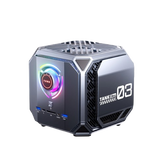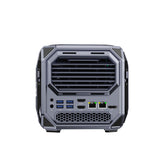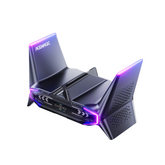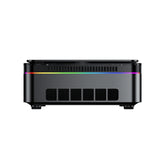2025 Mini PC Buying Guide: How to Choose the Perfect Compact Computer
What Is a Mini PC and Why Is It Popular?
Entering the realm of small computing begins with an open mini PC buying guide. For anyone entering into how to choose a mini PC that is right for lifestyle and affordability, it is crucial to understand what mini PCs are and why they have drawn such popularity.
What is a mini PC used for?
A mini PC is a compact, but complete computer that does lots of things without occupying large areas. They are employed for daily chores such as web browsing, office work, content streaming, programming, light gaming, and being a home server. They are handy in residential and corporate environments because they have many uses.
Why the use of a mini PC is ideal
Space-saving design Mini PCs take up significantly less space than traditional towers. Mini PCs are ideal for small desks, minimal setups, and wall mounting behind screens.
Quiet and efficient operation Mini PCs are driven by low-power CPUs and advanced thermal designs, so they use less power and make very little noise. This translates into cost savings in long-term operation.
Variety of use scenarios: home, office, streaming, light gaming Regardless of whether you're installing a home theater, equipping a remote office, or running digital signage, mini PCs are easy to adapt. Many mini PCs can drive dual or triple monitors, wireless connectivity, and 4K output.
How to Select a Mini PC: Top Issues You Need to Consider
Knowing how to select a mini PC starts with matching the capabilities of the device with your own personal or business needs. Here are the essential criteria to consider before buying.
What is the best mini PC for you?
Begin by determining the primary function the mini PC will be used for:
-
Office work: Value reliability, support for multiple monitors, and minimal noise.
-
Gaming: Seek high-performance CPUs, built-in or dedicated graphics, and effective cooling.
-
Home theater: Emphasize 4K video output and silent operation.
-
Education or student use: Balance performance vs. cost.
-
Server use: Opt for network reliability and expandable storage.
Define your own acceptable compromises between cost and performance. Low-end systems work fine for emails and document editing, but more intensive applications require high-powered specs.
CPU Matters: Intel or AMD?
Processors lie at the heart of performance:
-
Intel N100/i3/i5/i7: Suitable for routine computing, with i5 and i7 offering quicker performance for heavier applications.
-
AMD Ryzen 5/7: Praised for better multi-core performance, which is especially useful for creative work and gaming.
Take note of heat management and integrated graphics support as well, if you're not relying on a dedicated graphics card.

RAM and Storage: How much is enough?
Shoot for at least 8GB of RAM for fluid multitasking. For heavy usage, 16GB is a good place to start.
For storage, seek out SSDs first, especially NVMe over SATA, with faster boot and load times. Also, check if the mini PC supports future upgrade so that you can add RAM or storage as needs evolve.
What Should I Look for in a Mini PC?
This section is an applied continuation of how to select a mini PC. A careful checklist precludes options from consideration that fall below your minimum requirements.
Connectivity and Ports
Make sure your mini PC has the following:
-
USB 3.2 or better for high-speed data transfer
-
HDMI and/or DisplayPort for video output
-
Ethernet and Wi-Fi (ideally Wi-Fi 6)
-
Bluetooth, if wireless peripherals are required
Seek support for multiple display setups, especially when multitasking or creative work is the top priority.

Operating System and Software Support
Most mini PCs come with Windows 11 preinstalled, though some support Linux or ChromeOS. Consider whether you want a system with the OS preinstalled or will be installing your own.
Some users like the freedom of being able to install one's own custom environments, especially developers or enterprise teams.
A good mini PC should provide easy access to internals. Look for those which are tool-free or have removable panels.
Look for:
- Easy access to RAM and SSD slots
- Silent and efficient cooling systems
- Firmware updates and service
Actual User Needs Mini PC Recommendations
Your dream mini PC depends on actual usage habits. Here are recommendations based on common scenarios.
Ideal mini PC for home and media use
Seek:
-
Youthsized with passive or whisper-silent cooling
-
Stable Wi-Fi, at minimum HDMI 2.0 or DisplayPort
-
4K playback offers the support
These devices are best suited for web streaming websites, web browsing, and smart TV integration.
Best mini PC for business and multitasking
Choose:
-
16GB RAM or more
-
Fast SSD (NVMe is ideal)
-
Support for multiple monitors
-
Video conferencing and office software stability
This tier is best suited for professionals handling browser windows, spreadsheets, and regular work software.
Best mini PC for gaming or creative use
Essential features:
-
AMD Ryzen 7 or Intel i7
-
Built-in graphics with support for eGPU (external GPU)
-
Dual-fan system
-
High-speed NVMe SSD
-
Optional RGB lighting for visual purposes
These PCs offer the processing capability for photo/video editing, light gaming, and creative software like Adobe Suite.
What Are the Best Mini PCs to Buy in 2025?
Below is a comparison chart of three ACEMAGIC models designed to meet different user needs:
| Feature | ACEMAGIC S3A (Ryzen 7 5700U) | ACEMAGIC S3A (Ryzen 7 6800H) | ACEMAGIC M1A TANK 03 (Intel i9 + RTX 4060) |
|---|---|---|---|
| Processor | AMD Ryzen™ 7 5700U (8C/16T, 1.8–4.3GHz) | AMD Ryzen™ 7 6800H (8C/16T, 3.2–4.7GHz, Zen3+, 6nm) | Intel® Core™ i9-12900H (14C/20T, 2.5–5.0GHz) |
| Graphics | AMD Radeon™ Graphics (1900MHz, 8 cores) | AMD Radeon™ 680M (2200MHz, 12 cores) | NVIDIA GeForce RTX 4060 (8GB GDDR6) |
| Memory | 32GB DDR4 2666MHz (2×16GB, up to 64GB) | 32GB DDR5 4800MHz (2×16GB, up to 64GB) | 32GB DDR5 4800MHz (2×16GB, up to 64GB) |
| Storage | 1TB M.2 2280 SSD (NVMe/SATA) | 1TB M.2 2280 SSD (NVMe only, up to 4TB) | 1TB M.2 2280 PCIe 3.0×4 NVMe SSD |
| Wireless | Wi-Fi 6 + BT 5.2 | Wi-Fi 6 + BT 5.2 | Wi-Fi 6 + BT 5.2 |
| Video Output | HDMI 2.0 (4K@60Hz), USB-C, DP1.4 | HDMI 2.0, USB-C, DP2.0 (all 4K@60Hz) | HDMI 2.0 ×2 (4K@60Hz), USB4 (8K@60Hz), DP1.4 (8K@60Hz) |
| Audio | — | DP, HDMI, USB-C, 3.5mm jack | DP, HDMI, USB-C, 3.5mm jack |
These options cover a full spectrum of needs from budget-conscious students to demanding creators and gamers.
Which mini PC fits which user?
-
ACEMAGIC S3A (Ryzen 7 5700U) is a great all-rounder for home use, casual productivity, and light multitasking. Ideal for students, remote workers, or media lovers looking for a balance of performance and silence.
-
ACEMAGIC S3A (Ryzen 7 6800H) targets advanced productivity users who need more power for heavier multitasking, creative work, and enhanced graphics without stepping into full gaming territory.
-
ACEMAGIC M1A TANK 03 (Intel i9 + RTX 4060) caters to gamers, creators, and professionals running resource-intensive applications such as video editing suites or 3D modeling tools.

ACEMAGIC S3A Mini PC
With a vertical space-saving design and tool-free magnetic access, the S3A makes upgrades effortless. Ryzen CPUs power it up to the AI-ready 8945HS and handle everything from daily tasks to creative work. DDR5 and PCIe 4.0 deliver ultra-fast performance, while dual-fan cooling keeps it quiet and stable.

ACEMAGIC M1A Mini PC
The ACEMAGIC TANK03 12900H Pro is a powerhouse mini PC featuring the Intel® Core™ i9-12900H processor and NVIDIA GeForce RTX 4060 GPU, delivering exceptional performance for gaming, AI, and professional tasks.
Conclusion: Which Mini PC Should You Choose?
Choosing the right mini PC is all about striking a balance between your intended use and hardware options. All of these come into play with performance and longevity:
-
CPU type
-
Disk space
-
Number of ports
-
Upgradeability
A good mini PC gives you a tighter computing experience and minimizes wasted energy and real estate. We hope that this guide to buying a mini pc was instructive in showing you how to choose a mini pc.
To find out what models are stocked or to get personalized assistance, visit the ACEMAGIC Mini PCs page or chat with our support team.
FAQ – People Also Ask About Mini PCs
Are mini PCs capable of gaming or video editing?
Some of them are. Those that incorporate Ryzen 7 or Intel i7 processors and NVMe storage can handle entry-level gaming and video editing, considering integrated or external GPU connectivity.
Can the RAM and SSD on a mini PC be upgraded?
Some mini PCs support RAM and SSD upgrades. Check model specifications and ensure design is available for internal slots.
How long will a mini PC last?
A well-maintained mini PC will last 5 to 7 years, based on usage and build quality. There are some tips to extend the life of your mini pc
What is the difference between a desktop PC and a mini PC?
Mini PCs are far smaller and more power-conscious. While they have fewer upgrade paths and slightly less maximum performance, they're ideal for those who prioritize space, efficiency, and specialized workloads over raw muscle.









Leave a comment
Please note, comments need to be approved before they are published.